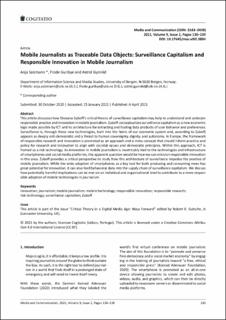Mobile Journalists as Tracable Data Objects: Surveillance Capitalism and Responsible Innovation in Mobile Journalism
Journal article, Peer reviewed
Published version

Åpne
Permanent lenke
https://hdl.handle.net/11250/2837989Utgivelsesdato
2021Metadata
Vis full innførselSamlinger
Sammendrag
This article discusses how Shosana Zuboff’s critical theory of surveillance capitalism may help to understand and underpin responsible practice and innovation in mobile journalism. Zuboff conceptualizes surveillance capitalism as a new economic logic made possible by ICT and its architecture for extracting and trading data products of user behavior and preferences. Surveillance is, through these new technologies, built into the fabric of our economic system and, according to Zuboff, appears as deeply anti-democratic and a threat to human sovereignty, dignity, and autonomy. In Europe, the framework of responsible research and innovation is promoted as an approach and a meta-concept that should inform practice and policy for research and innovation to align with societal values and democratic principles. Within this approach, ICT is framed as a risk technology. As innovation in mobile journalism is inextricably tied to the technologies and infrastructure of smartphones and social media platforms, the apparent question would be how we can envision responsible innovation in this area. Zuboff provides a critical perspective to study how this architecture of surveillance impedes the practice of mobile journalism. While the wide adoption of smartphones as a key tool for both producing and consuming news has great potential for innovation, it can also feed behavioral data into the supply chain of surveillance capitalism. We discuss how potentially harmful implications can be met on an individual and organizational level to contribute to a more responsible adoption of mobile technologies in journalism.
